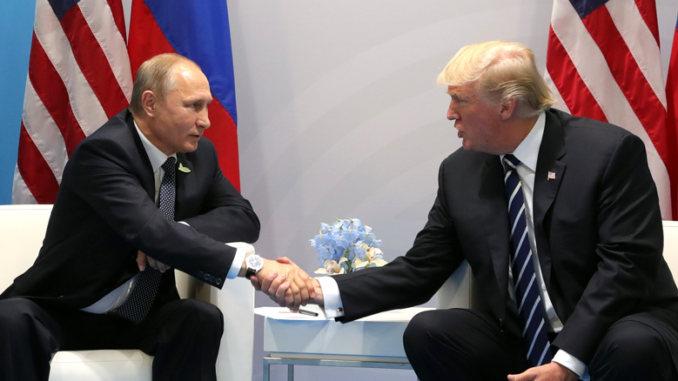
“Chairman Kim and I just signed a joint statement which he reaffirmed his unwavering commitment to complete denuclearization of the Korean Peninsula,” President Donald Trump declared following the conclusion of his summit with North Korean dictator Kim Jong-un on June 12 in Singapore (Vox.com). “Chairman Kim is on his way back to North Korea and I know for a fact that as soon as he arrives he will start a process that will make a lot of people very happy and very safe.” A day later, he tweeted, “There is no longer a Nuclear Treat from North Korea.”
Despite the President’s triumphalist language, it was the United States that yielded a significant concrete concession—an immediate suspension of future U.S.-South Korea joint military exercises—in exchange for North Korea’s simply repeating promises it had made as far back as 1993. In addition, the United States also enabled the North Korean dictator to present himself on the world stage as an “equal” with an American President.
In the wake of the summit, there were questions about where things would lead. Would the summit ultimately bring about a long-awaited denuclearized Korean Peninsula and a formal end to the Korean War or would the world witness yet another tragic ending to the latest diplomatic engagement with North Korea? The historic odds favored the latter outcome.
Now, there is growing evidence that North Korea has not made any fundamental commitment to “complete denuclearization” (language that was never in the communique to start with). Evidence is mounting that North Korea is ramping up its nuclear activities. On June 29, NBC News reported:
U.S. intelligence agencies believe that North Korea has increased its production of fuel for nuclear weapons at multiple secret sites in recent months — and that Kim Jong Un may try to hide those facilities as he seeks more concessions in nuclear talks with the Trump administration, U.S. officials told NBC News…
Analysts at the CIA and other intelligence agencies don’t see it that way, according to more than a dozen American officials who are familiar with their assessments and spoke on the condition of anonymity. They see a regime positioning itself to extract every concession it can from the Trump administration — while clinging to nuclear weapons it believes are essential to survival.
Despite the past failures of Presidents Clinton and Bush in engaging North Korea, why did President Trump proclaim an end to the North Korean nuclear threat following the start of his diplomatic process?
Perhaps, on the heels of a disastrous G-7 summit, he was desperate for a landmark success. Perhaps, in his obsessive benchmarking of his Administration against the Obama Presidency, he felt the need to declare a historic diplomatic breakthrough. Perhaps, wholly unfamiliar with the world stage, he truly believed that if he papered over the lack of his success at the summit with heady proclamations, the North Korean nuclear problem would simply go away.
Today, the world sees that the Trump-Kim summit appears to have been a failure. Aside from atmospherics, the summit achieved little—and perhaps nothing—when it came to addressing North Korea’s nuclear threat. Instead, it exposed the perils of premature summitry compounded by a noted lack of preparation.
Another summit, this time one between Russian President Vladimir Putin and President Trump, is just weeks away. As with the last one, there is little indication that intensive negotiations and detailed Presidential preparation are underway on the American side.
However, one can be sure that the detail-oriented Russian President is studying the outcome of the Trump-Kim summit very closely. His examination is likely aided by first-hand information from the North Korean government. One can also be sure that the Russian President is observing the American President’s ongoing and deepening economic, military, and political estrangement from Canada, Mexico, and Europe in search of possible opportunities to be exploit.
This contrasting approach makes such a summit especially risky. Even worse for President Trump, the Russian President is a grandmaster in world affairs. Therefore, absent some concrete agreements that begin to address core differences that separate the United States and Russia, perhaps it would be wise for the Trump Administration to devise a face-saving rationale to postpone the summit.
Henry Kissinger, who went on to play a pivotal role in preparing Presidents Richard Nixon and Gerald Ford for several historic summits explained of the use of summits in his The Necessity for Choice (New York: Harper & Brothers, 1961):
They should be held only when there is some clear, substantive advantage in prospect… High-level meetings can ratify agreements and give general guidelines for further detailed negotiations. They should be used for these purposes with courage and conviction. But to see in them a magic solvent for all difficulties is to build policy on illusion…
When the primary purpose of summit meetings is thought to be the fostering of abstract good will, they become not a forum for negotiations but a substitute for them; not an expression of a policy but a means of obscuring its absence.
President Trump traveled to Singapore likely thinking that his personal encounter with the North Korean dictator would be the “magic solvent” that would break the longstanding nuclear impasse with North Korea. He came away all but empty-handed.
Perhaps, another observation from Kissinger’s book is particularly relevant to the Trump Administration’s recent burst of summitry. Kissinger observed, “The constant international travels of heads of government without a clear program or purpose may be less an expression of statesmanship than a symptom of panic.” President Trump’s turn to summitry may be an expression of panic from an Administration that remains mired in difficulties, many of which are self-inflicted.
